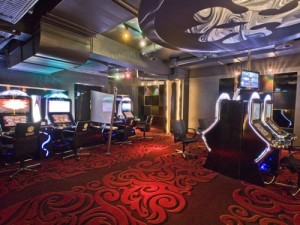The German AWP market currently stands at 265,000 machines, according to official statistics released on Wednesday by the German Institute for Economic Research in a study commissioned by the German coin-operated machine industry.


The figure is slightly up on the 2011 total of 262,000 and a major increase on the 183,000 installed base of 2005, immediately prior to the current regulations being introduced in 2006.
For all that apparently healthy set of statistics, the industry remains flat, with buying at a standstill since the Bundeslander, Germany’s semi-autonomous states, launched its Interstate Treaty on Gambling, in July of last year, an accord which sets out to ban the multi-licensing system that has come to dominate the German street market, with clusters of separately licensed arcades in one building to get around the federal law which limits the number of machines in each arcade.
The Interstate Treaty is being challenged in the courts by the German trade associations but, in the meantime, investment has halted and the industry cancelled its annual IMA trade show in January of this year, pending the outcome of the legal actions. The AWP business in Germany is dominated by the multigame video format with hardware being purchased or leased and the content rented. Another effect of the 2006 change in regulations has seen the cost of playing an AWP drop from €22.5 per hour to around €10.89 per hour.
Other statistics to come from the study show that German’s amusement games without prizes totalled 35,600, compared with 36,500 the previous year - more evidence of the decline in this sector from the 39,150 in 2009. Video games were down slightly from 10,200 to 10,000; touchscreen and jukeboxes were down from 2,600 to 2,500; internet terminals down from 21,500 to 21,000, and pinball slightly down from 2,200 to 2,100, altogether making up that 35,600 for amusement games without prizes. Sports games are down from 20,000 to 18,500.
The report states that the turnover for the three sectors of the German industry – manufacturing, distribution and operation – was €5.55bn in 2012, a decline of 0.4 per cent on 2011, but the figures also show that within that, the manufacturers’ turnover declined by 6.3 per cent and the turnover of distributors by 7.6 per cent. The blame for the downturn is placed squarely on the shoulders of the Interstate Treaty’s proposals to radically alter the framework of the industry.
The outlook for 2013 is described as: “In spite of an overall macro-economic satisfying environment, operators’ business will stagnate at best. Since the (Interstate Treaty) is in force for the whole of the year and further restrictions are expected, it is more likely that their turnover will decline.”
The report continued: “For the years to come a major challenge will emerge from a tax burden that has strongly grown over the recent past in a business environment characterised by stagnating or even declining turnover. Between 2005 and 2012, operators’ turnover with AWPs increased by 86 per cent, whereas simultaneously turnover with other amusement machines and sports games machines declined. Total turnover increased by 40 per cent. At the same time operators’ amusement tax payments have grown by 175 per cent. In particular, in more recent years the growth of the tax burden has accelerated. For a long time the tax burden – as measured by the ratio of amusement tax payments and operators’ turnover – was stable at around eight per cent. According to the latest available figures it has risen to 13 per cent.”
Plans at national and states levels to curb the number of machines in locations outside of arcades – restaurants and bars – will have a negative impact on sales on a gradually increasing scale up to 2018 when the current limit of three AWPs per location will be cut to just one.
The overall impact of the imposition of fresh national and local legislation is estimated by the report to cut the total number of AWPs in arcades by 55 per cent by 2017. The report suggests that a consequence of the loss of AWP opportunities for players will be the rise of illegal gambling.
Germany currently has 10,800 licensed amusement arcades with an average of 10.32 machines in each. The number of arcades will be cut to 7,200 if the current legislation proposals go through, says the report.

